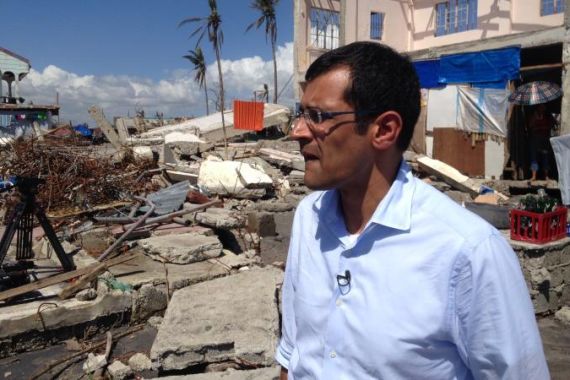Tacloban: A city destroyed, a people unbowed
My view of the world as a news anchor has changed irrevocably after a visit to Typhoon Haiyan’s “ground zero”.

Until two days ago, I’d never been to a major natural disaster zone. As a studio news anchor, I invariably see such events through the words and lenses of our reporters and camera crews who do such extraordinary work under the most trying conditions.
But two days ago, I visited Tacloban in central Philippines – Typhoon Haiyan’s “ground zero” – for a special edition of Counting the Cost. And I don’t think it’s an exaggeration to say my view of the world has changed irrevocably.
It is difficult, extremely difficult to put into words exactly what I saw there.
Even pictures don’t really convey the true situation.
In fact, even though I went myself, I’m still not sure I can ever fully comprehend just what happened when Haiyan tore through those parts of the Philippines.
It’s that unbelievable.
Debris of all sizes
Tacloban, as a city, is gone. A seven-metre tidal surge made sure of that. Houses and buildings were blown apart like mere matchsticks, which in the grand scheme of things some of them were.
Cars, buses and boats were swept inland, now lying haphazard in people’s gardens kilometres away.
Debris of all sizes and types litter every street – every single street. The further we drove, I convinced myself that the chaos had to stop. But it never did. If the tidal surge didn’t obliterate something, the wind inevitably finished it off.
You simply can’t imagine it.
I kept telling my crew that my eyes knew what they were seeing, and yet my brain couldn’t process it.
My excellent and hard-working cameraman Justin Okines covered the Indian Ocean tsunami in Aceh nine years ago, so he’s seen even worse.
He kept telling me I would somehow get used to it. I wasn’t so sure. But perhaps what was even more unbelievable was the resilience of Tacloban’s people.
They have next to nothing.
They have every reason to simply fold. Or throw their hands up in the air in despair and say “Why us?”.
Or demand that their government fix a seemingly unfixable problem.
But they don’t.
Can-do attitude
Well, maybe they do in private. But outwardly they have a can-do attitude that I’ve not encountered before, especially in such a dire situation.
They’re out there making things happen for themselves, because how else will the situation improve?
There’s years of work ahead might as well get started now.
A Chinese charity called Tzu Chi Foundation has set itself up in Tacloban, offering work-for-cash.
If people sign up and help clean up the town, they’ll get paid for it. 500 pesos a day, which is a little under $12. Not much, but infinitely better than nothing.
And there’s a triple pay-off. One, the people get work and money. Two, the local economy starts moving again as money circulates through pop-up markets. And three, the town slowly gets cleaned up – and it’s at the hands of its own community.
That’s a major psychological bonus.
In fact, standing in the rubbish-strewn street, filming and reporting their efforts, the temptation was to join in and lend a hand. The embarrassing reality was that I had my own job to do, a story to finish, and a helicopter coming to return me to “civilisation” just 30 minutes later.
And their generosity? It almost reduced me to tears.
We interviewed a fisherman who’d lost his house and his business – his fishing boat was one of those “toys” tossed inland by the angry sea.
Enough for one meal
From making 300 pesos a day catching and selling around 15kg of fish, he was down to almost no fish or cash. Just enough for about one meal.
He showed me the meal … that one tiny plate … and then he offered it to me. Me, the city-boy reporter with a job, money, and a comfortable hotel room waiting back in Cebu.
It was heart-breaking.
In the end, Justin was sort of right. After 48 hours I did get used to the sight of pure destruction.
There was no other choice if I was to get the job done. And if I go to another disaster zone again, I’ll be somewhat mentally prepared.
But my view of the world has changed too. I now know what real problems are. I see them on-screen all the time, but only seeing them in person can truly have an impact.
I’m sure I’ll still complain about the traffic, or that my internet connection is too weak, or any number of other things.
What I need to do though is remember Tacloban, and the people who have everything in the world to complain about, but somehow don’t.
They just get on with it.